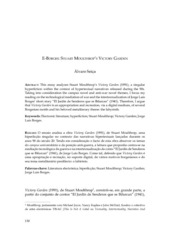E-Borges: Stuart Moulthrop’s Victory Garden
| dc.contributor.author | Seiça, Álvaro | eng |
| dc.date.accessioned | 2014-12-17T11:06:32Z | |
| dc.date.available | 2014-12-17T11:06:32Z | |
| dc.date.issued | 2012 | eng |
| dc.identifier.issn | 0874-1409 | |
| dc.identifier.uri | https://hdl.handle.net/1956/8952 | |
| dc.description.abstract | This essay analyses Stuart Moulthrop’s Victory Garden (1991), a singular hyperfiction within the context of hypertextual narratives released during the 90s. Taking into consideration the campus novel and anti-war novel themes, I focus my reading on the technological mediation of war and the intertextualization of Jorge Luis Borges’ short story “El Jardín de Senderos que se Bifurcan” (1941). Therefore, I argue that Victory Garden is an appropriation and recreation, via a digital medium, of several Borgesian motifs and his beloved metaliterary theme: the labyrinth. | en_US |
| dc.language.iso | eng | eng |
| dc.publisher | APEAA | eng |
| dc.subject | Electronic literature | eng |
| dc.subject | hyperfiction | eng |
| dc.subject | Stuart Moulthrop | eng |
| dc.subject | Victory Garden | eng |
| dc.subject | Jorge Luis Borges | eng |
| dc.title | E-Borges: Stuart Moulthrop’s Victory Garden | eng |
| dc.type | Peer reviewed | |
| dc.type | Journal article | |
| dc.date.updated | 2014-12-17T10:54:20Z | |
| dc.description.version | publishedVersion | |
| dc.rights.holder | Copyright 2014 The Authors | |
| dc.identifier.cristin | 1113473 | |
| dc.source.journal | Op. Cit.: A Journal of Anglo-American Studies | |
| dc.source.40 | II (1) | |
| dc.source.pagenumber | 130-141 |
